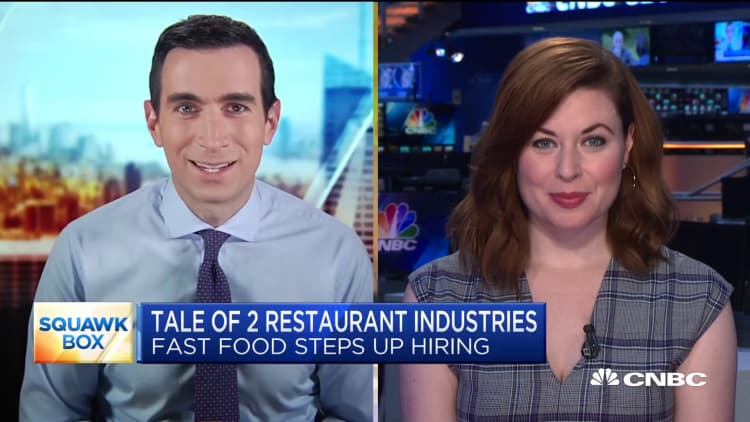Record-breaking job creation in May and June appear to be giving way to a more subdued pace, with a possibility that some of those gains even will be reversed.
Current consensus is for July nonfarm payrolls to rise by 1.26 million, according to economists surveyed by Dow Jones. The number would be well below the previous month's 4.8 million but still easily better than anything the U.S. has seen in the pre-Covid 19 era.
Still, recent signs are indicating that while the previous two months showed surprises to the upside, adding 7.5 million jobs in just two months, July's story could be different. Spiking coronavirus cases and rollbacks of reopenings in multiple states present roadblocks to continued aggressive gains in jobs.
"High frequency data suggest that the labor market recovery is stalling due to the worsening virus situation," Goldman Sachs economist Ronnie Walker said in a note. "Workplace activity measures have declined in the states hit hardest with virus spread and moved sideways in others since late June."

With events changing rapidly due to the evolving course of the pandemic, economists have become increasingly reliant on high-frequency measures such as credit card spending, foot and vehicular traffic, and job searches online as opposed to more traditional metrics.
Goldman's examination of the numbers points to a different jobs market than the consensus: the firm says the data is consistent with a drop of a million jobs and an increase in the unemployment rate from 11.1% to 11.5% rather than the forecast decline to 10.6%.
The census count
One measure gaining popularity is the weekly Household Pulse Survey from the U.S. Census.
The survey is a relatively new one but gives a rolling idea of how the jobs market is playing out. The numbers for the Labor Department's reference week, which includes the 12th of each month, paint a bleak picture: nearly 6.5 million fewer people on the employment rolls from the same week in June.
Nomura, which is forecasting a gain of 550,000, also is watching the census numbers and said that the big monthly decline could be the result of rising virus cases. Those would show up in the Labor Department report as paid sick leave and wouldn't count as job losses.
Nevertheless, "given the swift and substantial changes that have affected the labor market during the pandemic, we cannot rule out an outright decline in nonfarm payrolls during July," Nomura economists wrote.
The census gauge, combined with other downbeat employment reports, "are suggesting that labor market progress has already rolled over and July payrolls could be negative," wrote Brett Ryan, senior U.S. economist at Deutsche Bank.
Using the alternative measures, Ryan said indications are for a July decline of 400,000.
Recent moves in weekly jobless benefit claims, though, suggest that while unemployment rolls remain high, progress is being made on getting people back to work.
Amy Glaser, senior vice president at the Adecco job search site, said she continues to see brisk activity.
"Folks are going to be pleasantly surprised on Friday," Glaser said of the nonfarm payrolls count. "We're still seeing employers being cautiously optimistic. They've adjusted to the new normal."
Companies are focusing heavily on workplace safety and employee retention, but also looking at getting people back to work, she added. E-commerce is one particularly sector hot sector.
"I'm seeing positive signs for the future," Glaser said.



